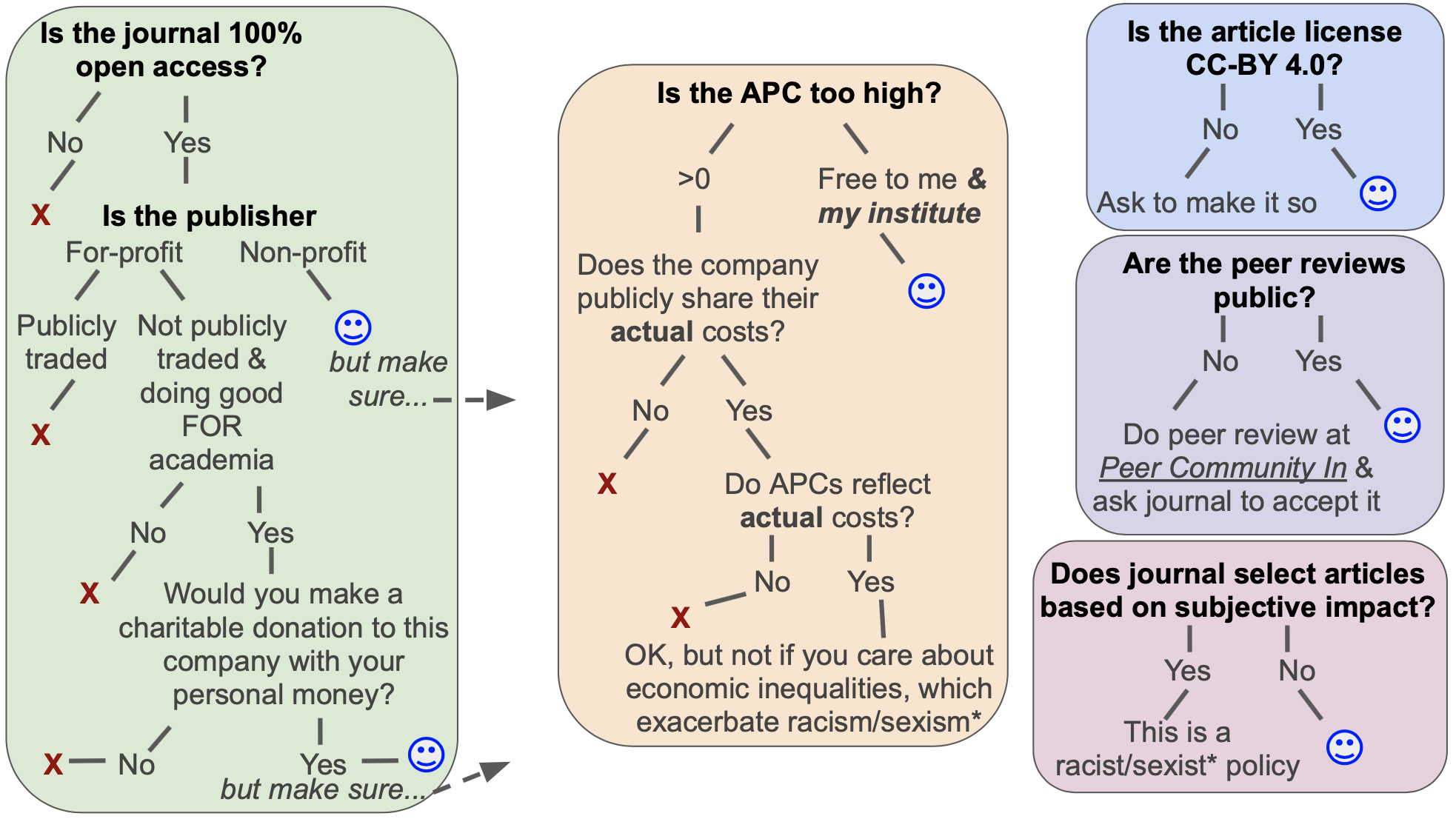|
|
Want to publish ethically?
Guide to We can shift academic culture through publishing choices (Logan 2017; talk & slides)

*...and other -isms. Learn about antiracism: How to be an antiracist by Ibram Kendi, So you want to talk about race by Ijeoma Oluo
100% open access peer review of preprints and registered reports by Peer Community In (PCI)
There are many PCIs (and if you don't see one in your field, you can start one!):
PCI Ecology,
PCI Evolutionary Biology,
PCI Paleontology,
PCI Animal Science,
PCI Zoology,
PCI Neuroscience,
PCI Genomics,
PCI Mathematical & Computational Biology,
PCI Forest & Wood Sciences,
PCI Archaeology,
PCI Network Science,
PCI Ecotoxicology & Environmental Chemistry,
PCI Infections,
PCI Microbiology,
PCI Health & Movement Sciences,
PCI Psychology,
PCI Registered Reports
All PCIs have the following features: the license for the preprint or registered report depends on the preprint server, the open peer reviews are CC-BY-4.0, and...
|
100% open access journals (in the DOAJ) at publishers that keep profits inside academia
in the field of animal behavior
^If institutions can pay, an APC of $1000 is requested
~Not on the list anymore = PeerJ because they got bought out by Taylor and Francis in 2024, and Royal Society Open Science (RSOS). As of January 2021, RSOS is included in a Transformative Agreement where institutions pay large amounts of money to the Royal Society every year so their researchers can publish articles in these journals. There are ethical issues with including a 100% open access journal in these contracts (see Logan & Lukas and a tweet thread here and here for details).
Don't see your favorite journal on this list?
Ask them to switch their journal to 100% open access and an ethical publisher. Below is a draft of an email I sent in May 2017 to the Cambridge Philosophical Society, which owns the journal Biological Reviews. Feel free to use it as a template to write to your societies.
- - -
Dear [fill in the blank],
I am writing because you are the Editor in Chief [or Council Member] of the [insert society name], which publishes [insert journal name]. I have been a member of the [insert society name] since 2008 and I want [insert journal name] to change from their current exploitative publisher ([insert publisher name]) to an ethical publishing business model, which will stop exploiting the researchers that give away their products for free (Logan 2017 https://f1000research.com/articles/6-518/v2).
The publishing landscape is changing rapidly and there are many options for scientific societies to consider when changing their journal to ethical publishing practices.
1) The cheapest way to run a 100% open access journal is to use free, open source software such as Open Journal Systems (https://pkp.sfu.ca/ojs/) or eLife Continuum (https://elifesciences.org/elife-news/materials-publishers-elife-continuum) that overlays a preprint server such as http://www.biorxiv.org. An author would submit a preprint to bioRxiv and then submit this preprint to the journal, which would use the free software to engage in the editorial and peer review process. If the preprint passes peer review, it would be published by having the authors upload the revised version to bioRxiv and the journal would update their website to link to the revised version. Using this process, it costs $0 to publish a 100% open access article.
Here are two case studies of journals that overlay arXiv using Scholastica software (Scholastica charges $10/article, https://scholasticahq.com) to manage the peer review process:
A) Discrete Analysis (born digital, based out of the University of Cambridge) https://gowers.wordpress.com/2015/09/10/discrete-analysis-an-arxiv-overlay-journal/
B) Internet Mathematics (changed from a big publisher) http://blog.scholasticahq.com/post/internet-mathematics-publishing-solo-using-scholastica/
Additionally, The ReScience Journal (https://rescience.github.io) is hosted at GitHub. The editorial process is managed manually and they only accept reproducible manuscripts, which can be exported to a number of formats, including LaTeX, which gives the final PDF an elegant look with no additional copyediting effort.
2) If this method does not appeal, one can use an ethical open access publisher such as Copernicus Publications (http://publications.copernicus.org) or Ubiquity Press (http://www.ubiquitypress.com) who charge a per page flat fee that covers their processing costs. Article processing charges are incurred in this route, but grants can be obtained to offset costs rather than charging authors.
I realise that many scientific societies rely on income from the publishers of their subscription-based journals; however, this business model is not sustainable in the long-term because universities and researchers are tired of paying outrageous fees to read their own research products. I have been talking with senior people at a variety of scientific societies and have learned that some are in the process of changing their business models to make money off of ventures that are not related to the publication of articles. For example, the Association of Field Ornithologists makes much more money from the company they recently purchased (that sells bird banding materials) than their Journal of Field Ornithology (published by Wiley).
If you would like to discuss any of this, feel free to contact me.
All my best,
Corina
|
|
|